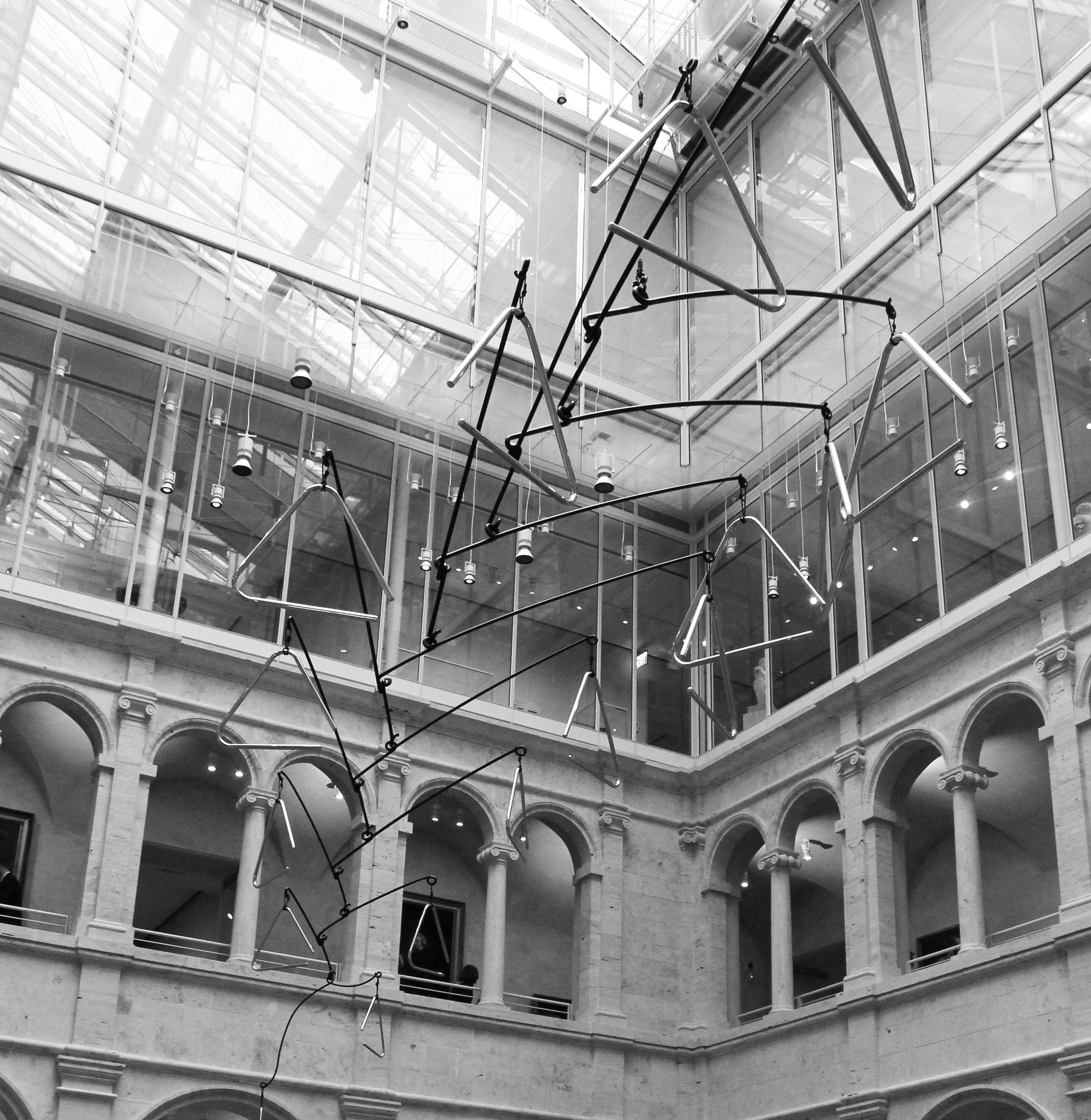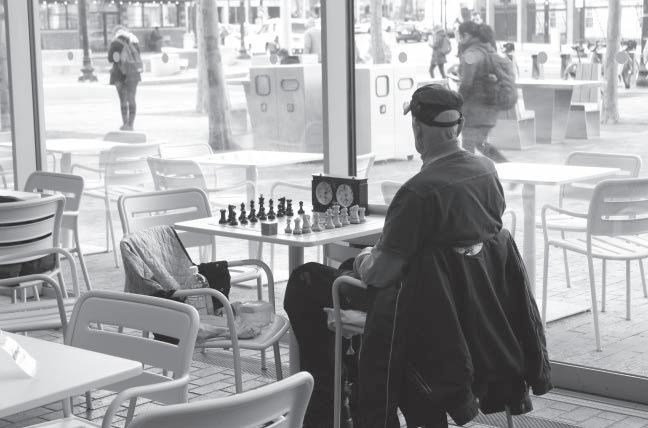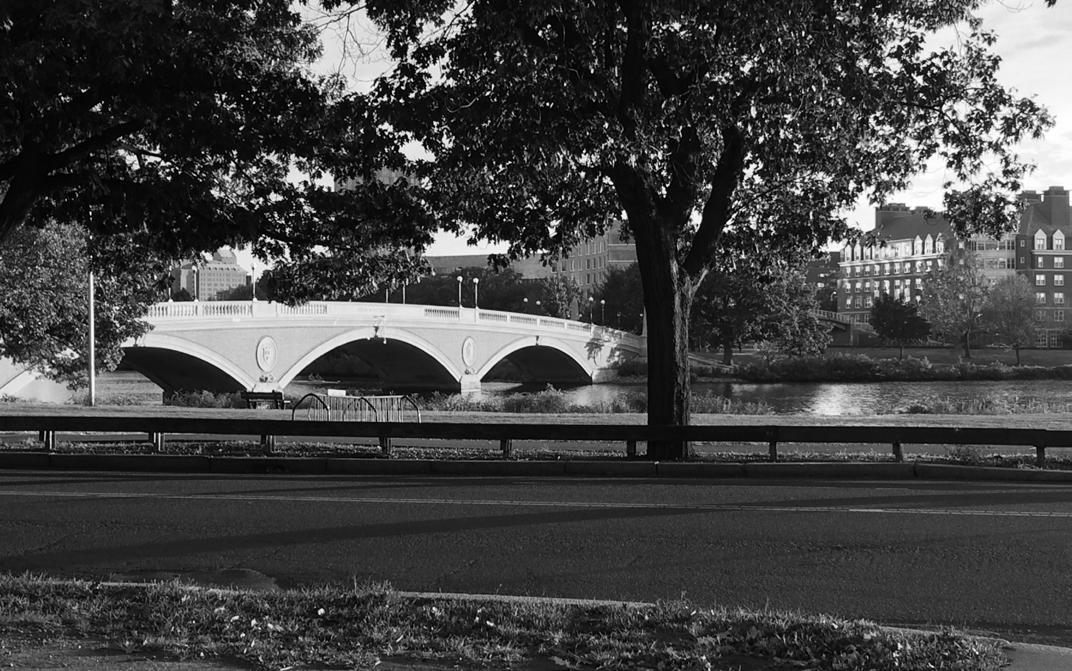
17 minute read
News
Burglars Target Laptops, Jackets, and Gold Jewelry
By Charles Xu Crimson Staff Writer
The Harvard University Police Department is investigating a series of thefts that occurred in River Houses and Yard dorms over the weekend, HUPD spokesperson Steven G. Catalano announced in an email to University affiliates Monday. HUPD officers responded to three separate reports of theft in Leverett House, 20 DeWolfe St., and Quincy House in the early hours of the Saturday morning, according to HUPD police logs. On Sunday, Harvard affiliates in Wigglesworth Hall report ed three more incidents of overnight theft. The stolen items included Apple laptops, Canada Goose jackets, and several gold necklaces valued at more than a thousand dollars.
In three of the incidents, the burglar or burglars entered an occupied room, but residents “did not observe or have any contact with the offender(s),” Catalano wrote.
HUPD has not determined if the six incidents are connected, but detectives are actively inves tigating the situation, according to Catalano. He wrote that any one with information about the thefts should contact the de partment.
Catalano and HUPD remind ed students that while burglaries in occupied rooms are “very rare,” residents should take certain precautions to prevent theft.
“Residents should not prop interior or exterior doors at any time, hold an outside door open for strangers or allow strangers to ‘piggyback’ on their access card,” Catalano wrote. “Resi dents should keep their room doors locked at all times even when in the room or when go ing down the hall for only a few minutes.”
Catalano did not respond to a request for comment. This inci dent comes a week after HUPD reported that more than $6,000 worth of electronics were sto len from the Dillon Fieldhouse in Allston, home to many varsity sports teams’ locker rooms, fa cilities, and coaches’ offices.
Numerous burglaries have been reported in freshman dorms and upperclassmen res idences in recent years. Over a weekend in September 2016, ten laptops disappeared from Yard and River dorms. In September 2018, students reported that a suspect climbed through a firstfloor window in Holworthy Hall and took laptops, wallets, and an iPad.
The Undergraduate Coun cil’s Student Life Committee voted unanimously 11-0 in favor of installing security cameras outside dorms in 2016.
Roughly 90 laptops are stolen each year at Harvard University, according to the HUPD website.
charles.xu@thecrimson.com
City Council Approves Petition to Lower Voting Age to 16
By Maria G. Gonzalez Crimson Staff Writer
The Cambridge City Council approved an order Monday night that could potentially lower the voting age for Cam bridge’s municipal elections.
The council voted 7-2 in fa vor of forwarding home rule legislation to the Massachu setts State Legislature that would allow citizens aged 16 and older to vote in Cam bridge elections for city council, school committee, and local ballot measures.
Currently, under Massachu setts state law, individuals must be 18 and older to vote in munic ipal elections. The approval of the home rule petition Monday night marks the third time Cam bridge has considered lowering the voting age for its municipal elections.
Although the council struck down a 2001 effort to lower the voting age to 16 and 17, it passed two similar measures in 2002 and 2006.
Both the 2002 and 2006 pe titions, however, were not ultimately approved by the state legislature.
Vice Mayor Alanna M. Mal lon acknowledged the petition’s unsuccessful past during Monday’s city council meeting. “This isn’t the first time this home rule legislation has left this building with a positive recommendation to the state legislature and not — unfortu nately — gone anywhere,” Mallon said.
“But I do think that the tide is turning,” she added.
Mallon also said that over the past year a new civics cur riculum in Massachusetts has encouraged high school stu dents in Cambridge to engage with municipal elections.
“They held mock debates, they looked at all of our plat forms, they wrote op-eds, they invited members in to have de bates. They asked some really hard questions,” she said.
“I would say that our young people were actually more in volved and understood more who was running and what they stood for than a lot of peo ple.”
Councilor Timothy J. Toom ey said he was concerned the new legislation would present too drastic of a change to the current voting age.
“I certainly appreciate the activism and the passion of our young people and getting in volved with this is so extremely important,” Toomey said. “But I do strongly feel that the mini mum age to be able to cast a vote should be 17 and I will continue to support that.”
Councilor Toomey and Councilor Patricia M. Nolan ’80 both voted against the petition,

while Mayor Sumbul Siddiqui, Vice Mayor Mallon, Councilor Marc C. McGovern, Council or E. Denise Simmons, Councilor Dennis J. Carlone, Councilor Quinton Y. Zondervan, and Councilor Jivan Sobrin ho-Wheeler voted in favor.
Students who spoke during the meeting said the city needs to be more inclusive of youth voices.
Sydney Down, a Cambridge Rindge and Latin student and member of the Cambridge Youth Council, said the voting preferences of students — as demonstrated in her school’s mock election — did not line up with the actual results of the city’s recent school committee election.
“Through this and the sub sequent unrest within the entirety of the community, it is evident that youth voice is not reflected enough,” Down said. At the end of her comment, Down emphasized the benefits of including younger voices in city decisions.
“Lowering the voting age will only further support young people in being civically en gaged and responsible citizens as they gain the ability to con tribute to making our towns, cities, and states equitable and sustainable communities,” she said.
maria.gonzalez@thecrimson.com
Proposed Bill Protects Grad Student Workers
By D v A y Crimson Staff Writer
Senator Bernie Sanders (D-Vt.) has introduced a new bill which — if passed — could protect graduate student workers’ em ployee rights from a proposed National Labor Relations Board rule that would classify gradu ate student workers as non-employees, experts say.
Sanders introduced the bill to the Senate on Jan. 22. He said it would prohibit the NLRB from “enacting a proposed rule which would strip grad uate student workers’ right to unionize” in a press release.
Sanders’s bill represents the continuation of H.R.5104 — the Respect Graduate Student Workers Act, which was initial ly proposed by United States Representative Mark W. Pocan (D-Wisc.) in Nov. 2019.
The Harvard Graduate Stu dents Union-United Automobile Workers won the right to unionize in 2018, but if the NL RB’s proposed rule were to be passed, there would be no legal requirement that the Universi ty should recognize that right. William A. Herbert, the ex ecutive director of the National Center for the Study of Collective Bargaining in Higher Education and the Professions at Hunter College, City Univer sity of New York, said the proposed rule would leave it to the University to decide whether or not to honor the union’s status. “If there’s no contract in place at Harvard with the grad uate assistants, and the NLRB issues a rule that says that grad uate systems are not covered under the National Labor Re lations Act, then the university would have the discretion to say that they’re not going to continue to recognize the union,” Herbert said.
He said regardless of the de cision that the NLRB makes, whether a university choos es to honor its students’ right to unionize or not speaks to its moral values.
“Institutions that under stand collective bargaining to be a form of workplace democ racy probably will be more likely to engage in voluntary recognition,” Herbert added.
University of Oregon asso ciate professor Gordon Lafer, who formerly served as a se nior labor policy advisor for the U.S. House of Representatives Committee on Education and Labor, wrote in an email to The Crimson that he believes the bill Sanders and Pocan have in troduced is an appropriate response to the actions of the current NLRB.
“What Sanders’ bill does is stop this ongoing game of po litical football with the labor rights of graduate students, by putting into law what every other authority has recognized, and what is the palpable reality of university life,” Lafer wrote in the email.
Former NLRB Chairman William B. Gould IV said that the NLRB has generally used rulemaking sparingly, and usu ally to “clarify ambiguity that exists in the current wall.”
“This would be the first in stance of doctrinal reversal through rulemaking,” Gould said. “I think it’s inappropri ate and I think Senator Sanders and others are wise to attempt to stop this.”
Though the NLRB is like ly to adopt this proposed rule, according to Gould, he said he thought that the Respect Grad uate Student Workers Act is an effective response to how the NLRB has handled gradu ate students’ right to collective bargaining in the past.
“It would clearly give grad uate students the right to organize and to bargain collectively — something that has been pro vided for by the National Labor Relations Act, but for which we have every indication that this board will try to take away from graduate students,” Gould said University spokesperson Jonathan Swain declined to comment on what effects the proposed NLRB rule would have on union negotiations.
Swain referred to an ear lier comment on the status of the HGSU-UAW negotiations, which said that the University is “currently reviewing the pro posed rule to assess its implications.”
The proposed rule is open for a public comment period until Feb. 28, after which the NLRB will review comments and ultimately decide wheth er or not to adopt the proposed rule as a final rule.
Still, Gould said it’s “quite likely” that the NLRB will have a sufficient majority to adopt the rule.
“They’re entirely predict able along ideological lines,” he said.
davit.antonyan@thecrimson.com
COMPLAINT From page 1 Deported Iranian Student Files Civil Rights Complaint
offices mandating officers to vet “all individuals” born between 1961 and 2001 with any “link” to Iran or Lebanon, according to POLITICO.
“We’re starting to see a pat tern of these expedited removals at Logan Airport,” Jason Corral, , an attorney at the Har vard Immigration and Refugee Clinical Program and one of Arandi’s lawyers, said.
Corral said he sees no basis for CBP to conclude that Aran di intended to stay in the U.S. permanently. Arandi has no friends or family in the United States, and the Divinity School is the only program in the Unit ed States she applied to, he said. “We weren’t given any infor mation as to why she had been detained,” Corral said.
Arandi flew home to Iran that night, having given up her employment at home and for feited the opportunity to study at Harvard last fall.
The Department of Home land Security did not immediately respond to a request for comment.Arandi’s lawyers subsequently filed a motion with CBP to reopen and rescind the expedited removal order on Oct. 18, asking that CBP to come to a decision by Oct. 25 so Aran di could still attend the Harvard Divinity School this academic year, according to December’s court filing.
CBP did not come to a deci sion on the motion within the timeframe, so Church filed a mandamus petition in the U.S. District Court in the District Reihana Emami Arandi is an Iranian citizen deported from Logan International Airport last fall. Joshua A. ng—Crimson photographer
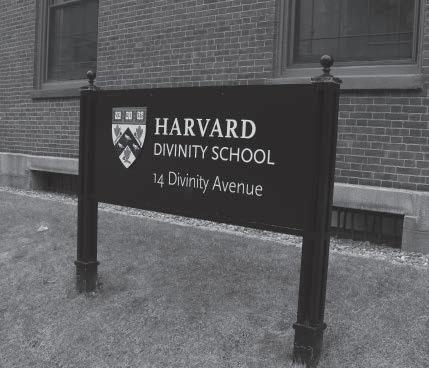
of Massachusetts on Novem ber 14, requesting the Court require CBP to quickly adjudicate the motion.
On Nov. 26, CBP denied the motion to rescind the expedit ed removal order without providing more information. Arandi’s lawyers revised the petition and refiled it on Dec. 16. The revised petition is current ly pending before court.
“It’s a serious problem when our government allows a student to have three to four months of vetting and allows a single CBP officer, with the ap proval of a supervisor, to take that away,” Church said.
In response to concerns about international travel and CBP inspections at the bor der, Harvard’s Vice Provost for International Affairs Mark C. Elliott wrote a letter to the school’s Iranian communi ty on Jan. 15. The letter included a link to an ACLU document regarding the rights of people entering the U.S. at the border, as well as information about handling CBP secondary inspections. Newton wrote in an email that “while HIRC is handling all aspects of the le gal case, HIO continues to be in regular contact with Reihana.”
luke.williams@thecrimson.com matteo.wong@thecrimson.com
The inside scoop on Harvard, straight to your inbox.
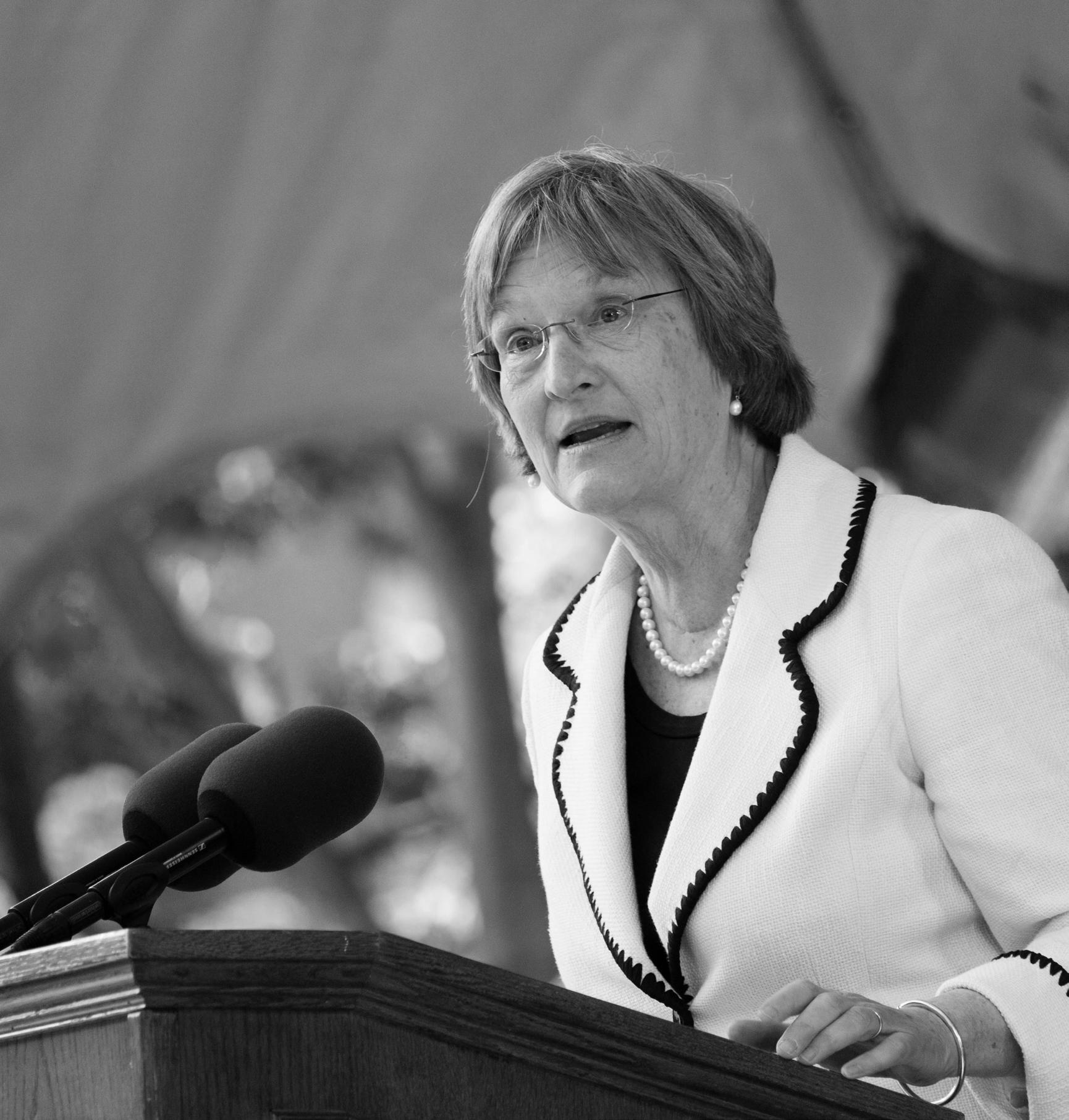
Never be out of the loop.
The Crimson
LIEBER FROM PAGE 1 Lieber Arrest Part of Crackdown
attract scholars from across the world to contribute to Chinese development. The U.S. government has since said the program poses a danger to national security.
The FBI and National Institutes of Health have contacted colleges and universities nationwide warning of espionage and intellectual property theft, Dean of Science Christopher W. Stubbs announced at a November meeting of the Faculty of Arts and Sciences. Harvard formed two new oversight committees this fall in response to those inquiries.
Earlier in January, Customs and Border Patrol agents stopped Zaoseng Zheng, a researcher affiliated with Harvard Medical School, as he attempted to smuggle biological research from Beth Israel Deaconess Medical Center to China. Zheng was charged in connection to academic espionage alongside Lieber last week.
History professor William C. Kirby — who conducts research on contemporary China — wrote in an email that instances of espionage against the U.S. in decades past may have informed the current federal investigations. Kirby also wrote that a deterioration in U.S.-China relations over the past three years may have prompted the increase in investigations.
Stephanie Segal, a senior fellow at the Center for Strategic and International Studies, said she hopes the recent push will not have the effect of “dividing” the global research community. “The outcome of this will hopefully not be erecting barriers to scientific collaboration,” Segal said. “Rather, that the integrity of those collaborations and kind of respect for the findings of the research collaboration are ones that the entire global community can benefit from.”
Segal added that China should not be held to a different standard than other countries, but regulators should ensure that research can benefit everyone.
“Foreign research collaboration can benefit the United States,” Segal said. “When there are foreign research collaborations with China, the priority needs to be on making sure that the benefits and the results of that research are ones that are shared broadly across the scientific community.”
Claude E. Barfield, a former consultant to the Office of the U.S. Trade Representative, used the recent coronavirus epidemic — which originated in China — as an example of a pressing issue that demands the two countries maintain research ties.
“The Chinese scientists are right there on the scene, and the U.S. scientists, we are picking up from the cases here,” Barfield said. “There’s some areas that you certainly don’t want to cut off scientific collaboration.”
Ross E. McKinney, Jr., the Chief Scientific Officer of the Association of American Medical Colleges, wrote in an emailed statement that U.S. and Chinese researchers have shared a “fruitful and constructive collaboration that has advanced science and discovery.”
McKinney warned that the recent enforcement could spark suspicions about Chinese researchers in American labs.
“The fact that the Chinese government recruited faculty then told them to lie to their US employers and the federal government is problematic because it could raise suspicions about anyone with a collaboration with China, whether warranted or not,” McKinney wrote. “This is not about targeting individuals who are ethnically Chinese — it’s about the systematic actions of a foreign government.” Several experts said China’s efforts to recruit scholars in other countries are not unusual. Kirby wrote in an email that the efforts are “quite natural.”
“China is investing more than any country in higher education, and as it expands its universities, it seeks talent from all sources,” he wrote. “It is, to be sure, a major effort, but we need to remember that every major research university seeks to recruit the best talent available, and if that talent is elsewhere, to bring them here. Certainly Harvard does that.”
Multiple Thousands Talents members said they did not interact directly with the national Chinese government during their time as members.
Tim Byrnes, an assistant professor of physics at NYU Shanghai and a member of the Thousand Talents program, said the program bears similarities to talent-attracting programs offered in other countries.
“I’m from Australia, which has its sort of equivalent kind of startup grant funded by the government,” Byrnes said. “Unfortunately, it got these connotations of somehow being connected to espionage. From what I can see, it’s really no different to any other types of talent-attracting grant.”
Byrnes said he has never been required to submit information to the Chinese government since he was awarded his grant four years ago.
W. Martin de Jong, a business professor at Erasmus University and former Thousand Talents participant, said he was appointed by the Shanghai government, rather than the national Chinese government, to serve as a part-time professor at Fudan University.
Segal and Barfield both said that, ultimately, they believe universities have the onus to police their own researchers’ connections to China.
“A lot of this is going to get back to the universities, to Harvard in this case — it should know what its scientists are doing and what impact that has, if any, on Harvard’s own goals and Harvard’s own standards,” Barfield said.
In the wake of Lieber’s arrest, University spokesperson Jonathan L. Swain announced Harvard was launching an internal investigation into Lieber’s case, though he declined to specify the scope of the probe. Segal said that because universities have “pushed back” against heavy-handed enforcement measures taken by the federal government, such as restricting work with specific individuals, academic institutions will bear the responsibility for enforcement.
“There’s a lot more attention being paid as to whether or not the universities are making sure that laboratories and researchers in those laboratories are complying with disclosure policies,” Segal said. “And so inevitably, I think, unless the universities want the government to be taking a much more heavy-handed approach, it’s going to fall to the universities to demonstrate compliance.”
kevin.chen@thecrimson.com james.bikales@thecrimson.com
DOMINGUEZ FROM PAGE 1 Accusers Criticize External Review
graduate students in the department had called for since the allegations first became public.
The four women met with the external review committee before Monday’s discussion. Grossman said during the panel that she feels there is a “worrisome lack of transparency” about the committee’s method and goals.
“Who are they meeting with? Are they considering best practices or research in designing their approach? What form will the findings take? Will they be public? Has Harvard committed to responding to these recommendations?” Grossman said.
“Today we met with the external review committee, and they did not answer these questions,” she added.
In a Sept. 6 email to Government professor Steven R. Levitsky, Bacow wrote that he charged the committee with using the Domínguez case to “frame the review,” rather than conducting a “re-investigation of the allegations” against Domínguez.
Sherman wrote in an email after the panel that, in her meeting with the external review committee, she “directly challenged” the premise that it would be able to accomplish its mission without a “full record of the past,” including re-examining complaints against Domínguez.
“I think it’s fair to say the Committee disagreed,” Sherman wrote.
University spokesperson Jonathan L. Swain wrote in an emailed statement that the external review is “ongoing” and is working to collect information through conversations in person and over the phone as well as in writing.
“The committee and the University are committed to ensuring this review is a robust examination of factors that may undermine the ability to prevent or address incidents of sexual harassment and assault,” Swain wrote.
At the end of the panel, the women called on Harvard to adopt a third-party grievance procedure for sexual harassment and discrimination complaints.
The panel was co-hosted by the Government Graduate Student Association and Harvard Graduate Students Union-United Automobile Workers, which has made sexual harassment protections a central goal in its contract negotiations with the University.
In those negotiations, the union has proposed that student workers be given an option to raise complaints through a union grievance procedure — a dispute resolution mechanism outside of internal Harvard channels that could eventually lead to third-party arbitration in some cases.
The University, on the other hand, has insisted that these complaints be handled through Title IX and its Office for Dispute Resolution, and through internal discrimination procedures.
kevin.chen@thecrimson.com james.bikales@thecrimson.com
The latest on music, film, theater, and culture.
